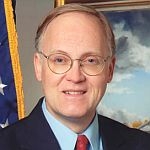 (Host) As the Presidential campaign heats up, along with the weather,
(Host) As the Presidential campaign heats up, along with the weather,
former Vermont governor and commentator Jim Douglas says it’s an
opportune time to think about the role Vermont has played in
Presidential politics and history.
(Douglas) Everyone knows that two of our chief executives were born here, but there’s a lot more to the story.
Vermont
Congressman Matthew Lyon was imprisoned for violating the Alien and
Sedition Acts by criticizing President John Adams, and then arrived
triumphantly in Philadelphia to cast the tie-breaking vote for Thomas
Jefferson in the 1800 election, denying Adams a 2nd term. It was decided
by the House of Representatives because the two candidates tied in the
Electoral College.
Abraham Lincoln never visited Vermont, but we
gave him the highest percent of votes of any state in 1860. Perhaps
that was due to our 1st-on-the-continent ban on slavery or because his
Vermont-born opponent, Stephen Douglas, dissed his home by saying that,
"Vermont was a good State to be born in….Yet it does a man good to
emigrate." Lincoln’s son, Robert Todd, built a summer home in
Manchester, where several succeeding generations lived.
Vermont
Senator George Edmunds, for whom a Burlington public school is named,
chaired the commission that resolved the disputed election of 1876 when
Rutherford Hayes was declared the winner. The new vice-president,
William Wheeler, had attended the University of Vermont.
Four
years later Chester Arthur, born in Fairfield, was elected
vice-president and succeeded to the White House on the death six months
later of President Garfield. Robert Todd Lincoln served both as
secretary of war.
Coincidentally, another Vermont native was the
Republicans’ 1st choice for vice-president that year. He was Levi
Morton, born in Shoreham, who declined the honor, preferring instead to
serve as minister to France. I wonder if he had 2nd thoughts when he saw
Arthur ascend so quickly. Morton, though, would have another chance. He
was chosen to run with Benjamin Harrison and was elected vice-president
in 1888. The two didn’t get along well and Morton was denied
re-nomination the next time around. But Harrison lost anyway to Democrat
Grover Cleveland, and Morton went on to serve as governor of New York.
Calvin
Coolidge, born in the hamlet of Plymouth Notch, held local and state
offices in Massachusetts. As governor, he was picked to run for
vice-president in 1920. The death of President Harding three years later
prompted the legendary lamplight inauguration in the parlor of the
family homestead. Coolidge was administered the presidential oath in the
wee hours of the morning by his father, a notary public.
Summer
is a great time to visit the sites of Vermont’s presidential history:
the Stephen Douglas birthplace in Brandon; Robert Todd Lincoln’s home,
Hildene; the Chester Arthur birthplace in Fairfield; and the Calvin
Coolidge Historic Site in Plymouth; be sure to check out the new
permanent exhibit in the Calvin Coolidge Memorial Foundation’s museum.
America
will write a new chapter in our presidential history this fall. In the
meantime, it’s fun to study the past, especially the contributions of
what Coolidge called ‘this brave little state of Vermont.’